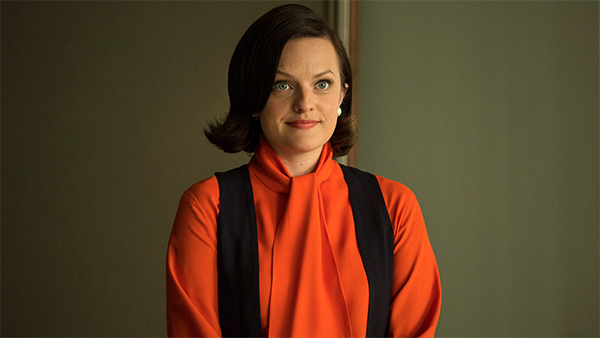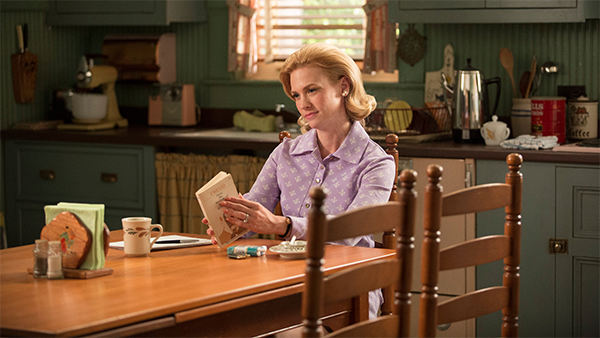Mad Men "Lost Horizon" Review: The Death of Don Draper
Mad Men S07E12: "Lost Horizon"

Don Draper is dead. Long live Don Draper.
It's true, the man behind the persona yet lives, giving rides to hitchhikers and meandering his way across America On the Road-style. It's a given that he'll ultimately turn up in California by the time the finale airs in two weeks. However, whose to say what that man will be calling himself when we see him again. Don Draper was never more than an idea, and these days, no one, not even the man who created him, actually needs that idea anymore. (Or they do and they just don't realize it.)
"In Lost Horizon," the bright, airy halls of Sterling Cooper & Partners gave way to the cold, gray halls of McCann Erickson. Even from an audience standpoint, the sets for the big league offices sucked the life out of every scene. They were cramped and dark and full of nervous people trying to escape. The frenetic, creative mess of SC&P has been replaced by Harry Crane's ultimate wet dream: statisticians and analysts, order and hierarchy (of which he is near the top, of course), and a sterility born out of the idea that the big computer in the basement is better able to create and interpret the world than the bearded pot-head artists working out of a broom closet.
This world doesn't need Don Draper. It needs nameless, faceless cogs to make the big machine keep chugging along, never faltering, not for black secretaries or female executives or anyone else who can't assimilate into the good ol' white boys club.
So Don has left the building (and the state, and the time zone), but we are left with Peggy, who has finally come into her own as his protege-turned-equal. Peggy has held her own as a creative force in the ad world for a few seasons now, often outdoing Don's ideas in recent years and weaving her own image in the tapestry of life... but there have been challenges. There were the expectations of marriage, childrearing, and then, professionally, dull secretary work. Maybe if she worked real hard, one day she could have Joan's job—back before Joan's partnership. Peggy has never been entirely comfortable in her world despite her professional success, because these expectations weighed so heavily on everything. Like she told Roger, she had to make men comfortable in order to survive.
And Peggy has survived. She made it through every incarnation of Sterling Cooper, the personal crises, and the indignity of her initial treatment at McCann. But this isn't about survival anymore, this is about excelling. Peggy has created the ideal version of herself, the self she always wanted to be, and she walked into McCann like a total badass with her sunglasses, cigarette, and Bert Cooper tentacle porn. SO PROUD. Given Joan's difficulty in being her best self, however, it's pretty much a given that Peggy's struggles at Satan's ad agency have only begun.

Dick Whitman's fabrication of Don Draper is the most extreme example of Mad Men's characters creating their own selves, but the series has long followed the exploits of the grubby, flawed humans trying to make themselves gods. From Pete trying to be both a successful family man and a player to Roger's spoiled rich boy antics masking a deeper insecurity, no one on this show has ever been content with his or herself for very long. As we head into the series finale, however, there is a sense of closure looming over these recent experiments, like maybe everyone is finally getting to where they were meant to be.
For instance, Betty going back to school is an appropriate path for her character. Her history on Mad Men has been peppered with repeated reminders that she's actually very highly educated and intelligent. She gave up a career that she loved to marry Don and pop out his kids, and all the instability, craziness, childishness, and other Betty antics have been failed attempts to recapture what was lost. Betty is The Feminine Mystique personified. Maybe naming her "Betty" was no coincidence.
For all of our Mad Men success stories, however, there are still the stragglers. Pete will probably never be happy, and then there's Joan, who came so close to bringing her story full circle, only to falter and take the money instead. In what was otherwise a very strong episode in Mad Men's home stretch, Joan's story was an awkward, uncomfortable, and, yes, problematic segment that I'm not entirely sure knew what it was trying to say. Joan smacked of another Weiner female, Carmella Soprano, in that she came so close to having this amazing breakthrough, to "doing the right thing" and following her own principles... only to fall back on the easiest action available. The Sopranos was fueled by the idea that people never really change, regardless of how hard they try. It's cynical, sure, but also telling, that Mad Men is channeling The Sopranos as it plays its final episodes out in a decade not exactly known for its optimism.
What are we to make of Joan's exit? What are we to make of a woman who long played on male infatuation, who often used her sexuality as another professional skill and rejected all of the implications of this system only to ultimately allow herself to be bought out and shut up, and at half the price she was initially worth.
We can argue that she was between a rock and a hard place and that as a mother, she was more responsible for providing for Kevin than for leading a feminist revolt at a disgusting workplace. We can also argue that her final meeting with Roger shook her resolve and reminded her how rape culture—even though it hasn't been given a name yet—works. What if Joan took McCann to court and other women stepped forward to testify to the rampant sexual harassment within its walls, and then someone, somehow, dug up just how Joan got her partnership? It's true that she didn't want to do it, that it was a low point for everyone involved, and that on some level Joan regrets agreeing to it, but the case against McCann Erickson would be blown. It's not right, but it's real. The "she was asking for it" defense still works against victims today, but it was a slam dunk in 1970.
Joan's plight is a reflection of that "best self" persona backfiring. In the early days, Joan seemed more at ease with her status as the office vixen, but over time, it was the idea of that role that became more appealing than the reality. Once she reached partner status, Joan rejected that idea because she didn't need it anymore. Unfortunately, real change is hard and sometimes it's easier just to take the money and leave.
Which brings us back to Don. He has no family, no home, no one relying on him for anything, and his career has become unsatisfying. He created Don Draper to get out of Pennsylvania, to be the sort of glamorous, wealthy, womanizing executive in the big city that awkward little boys who grew up in abusive families and seedy brothels dreamt of one day being. Don has gone to some pretty horrifying extremes to reject his life as Dick Whitman, but as Don Draper's life becomes less of the dream and more disappointment, it seems that it's time for Dick Whitman to stop playing dress up.
NOTES
– This was a heavy episode. Thank goodness for drunk Peggy and Roger. And double thank goodness for drunk Peggy roller skating.
– Bert Cooper would have 150-year-old tentacle porn in his office.
– Joan took her Rolodex. Foreshadowing?
– "You were supposed to look out for us!" Peggy's exchange with Roger was great. Generational archetypes are fascinating, and theoretically, the same conflicts happen over and over again between them throughout time. Peggy, a boomer, berating Roger, a "greatest gen" vet, mirrored the similar millennial vs. boomer battles today.
– SASSY GHOST HALLUCINATION BERT COOPER!
– Bert was all over this episode, actually, which is fitting, seeing as he was the biggest proponent of "being your ideal self" and the office-dreamer-in-chief for the longest time.

